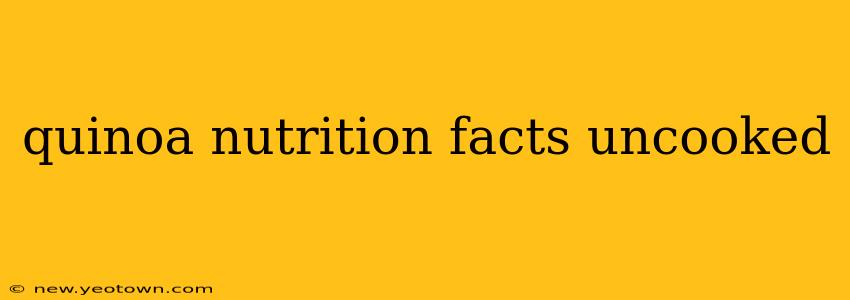Quinoa. The name itself whispers of health and exotic flavors. But beyond the trendy appeal, lies a nutritional powerhouse, especially when you consider its uncooked form. Let's dive into the fascinating world of quinoa nutrition, starting with the uncooked state and exploring why this grain is so beloved.
My journey into the world of quinoa began with a simple question: what makes this grain so special? It wasn't just the slightly nutty flavor or its versatility in the kitchen; it was the incredible nutrient density packed into each tiny seed. I started researching, poring over studies and nutrition databases, and what I uncovered was nothing short of amazing.
Quinoa Nutrition Facts: Uncooked
Before we delve into the specifics, it's crucial to understand that the nutritional values of quinoa can slightly vary depending on factors like the variety of quinoa, growing conditions, and processing methods. However, a general nutritional profile for 100 grams (approximately 1/2 cup) of uncooked quinoa provides a solid foundation:
- Calories: Approximately 360-370
- Protein: Around 14-15 grams – a significant amount for a grain.
- Fat: About 8 grams, largely unsaturated healthy fats.
- Carbohydrates: Around 60-65 grams, including both digestible and indigestible carbohydrates (fiber).
- Fiber: About 7 grams – excellent for gut health.
- Iron: A good source, contributing around 3-4 mg.
- Magnesium: A significant amount, beneficial for muscle function and nerve health.
- Manganese: Another important mineral, essential for metabolism and bone health.
- Phosphorus: Crucial for energy production and bone strength.
- Zinc: A trace mineral important for immune function and cell growth.
These are just some of the highlights; quinoa is also a good source of various B vitamins and other essential minerals.
What are the benefits of eating quinoa?
This question brings us to the heart of quinoa's appeal. The high protein content, coupled with its complete amino acid profile (meaning it contains all nine essential amino acids our bodies can't produce on their own), makes quinoa a fantastic choice for vegetarians and vegans. The fiber aids in digestion, promotes satiety (feeling full), and contributes to healthy blood sugar levels. The various vitamins and minerals support overall health and well-being.
Is quinoa a complete protein?
Yes, quinoa is indeed a complete protein, a relatively rare quality among plant-based foods. This means it contains all nine essential amino acids, making it a valuable protein source for individuals who don't consume animal products.
How many calories are in a cup of uncooked quinoa?
As mentioned earlier, approximately 360-370 calories are present in 100 grams (about ½ cup) of uncooked quinoa. A full cup of uncooked quinoa would therefore contain approximately 720-740 calories. Remember this value changes once it's cooked, as water is added to the grain.
Is quinoa good for weight loss?
Quinoa's high fiber content and protein make it a potentially beneficial food for weight management. The fiber helps you feel full for longer, reducing overall calorie intake. However, like with any food, moderation is key.
How much quinoa should I eat a day?
There's no single "magic" amount. The appropriate serving of quinoa depends on individual factors like your overall diet, activity level, and health goals. A reasonable amount might range from 1/2 to 1 cup cooked quinoa per day, as part of a balanced diet.
Conclusion
Quinoa's uncooked form holds a treasure trove of nutrition, forming the base for a wide array of healthy dishes. From its impressive protein content to its rich array of vitamins and minerals, quinoa deserves its place as a nutritional superstar. Understanding its nutritional profile empowers you to incorporate this versatile grain into your diet consciously, contributing to a healthier and more balanced lifestyle. Remember to always consult a nutritionist or healthcare professional for personalized dietary advice.

